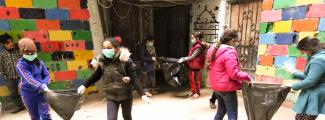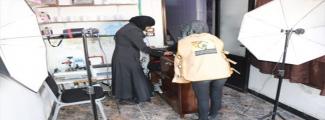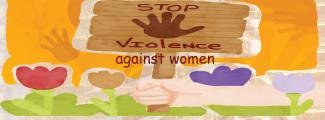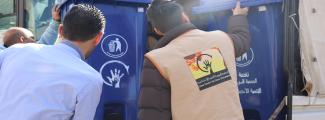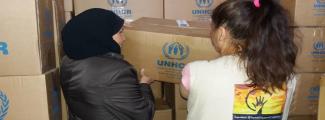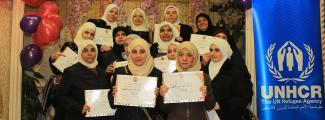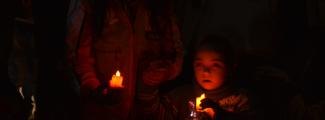Ms. Huda is 34 years old and has four daughters. She used to live in Babilah where, in accordance with local customs, she married at 15 a young man aged 21. He was unemployed, living in his parents’ home, and even receiving his pocket money from his mother, which gave the latter tremendous power over the couple. It is at this point that problems arose between the spouses.
Huda was very good at school and her parents had agreed to marry her off on the condition that she follows her education. After marriage, however, her husband and in-laws broke their promise and denied her the right to continue school. At her mother-in-law’s incitement, Huda was beaten and threatened with divorce, especially because she gave birth only to girls. Her parents advised her to remain patient—to no avail. Nothing in her life improved; on the contrary, things went from bad to worse.
Huda had a moment of respite when her husband left the country with his parents, leaving her with two young girls. So, she seized the occasion to resume her schooling. Soon after his return, however, she gave birth to her third daughter and problems returned…
It was then that he decided to marry someone else, a divorced woman who had already a son from a previous marriage. Huda returned home with her three daughters and filed a divorce lawsuit. In the meantime, she was employed in a school. But when the war broke out in Syria, she began with her family to move from one area to another and lost her job.
Desperate and resigned to her fate, she decided to return to her husband and traveled to Saudi Arabia to live with him, her fellow wife and in-laws. Soon enough, the man repeated the same old violence pattern, hitting her and the daughters. Then, a fourth daughter was born with a congenital heart defect.
One day, Huda learned that her husband had, seven months earlier, raped two of his daughters—one 10 years old and the other 12. Enough was enough! She decided to call the police. The girls were medically examined but that did not prove the fact because long time had elapsed since. The psychological report on the girls’ condition, however, confirmed their exposure to a traumatic event. Consequently, Huda and her daughters were referred to a protection center in Saudi Arabia, where they stayed for two years and a half unbeknownst to her parents. She fought for divorce, which she eventually obtained after much trouble and huge concessions, and retuned to Syria, only to live with her parents under extremely difficult circumstances and constant social rejection for being divorced.
Finally, Huda was told about the Beit al-Wiam Community Center, Jaramana, through her mother, who regularly attended the women’s sessions thereat. So, she visited the CC in the hope of getting help for her daughters.
She was soon referred to the CP case manager, who requested a concertation meeting with the psychologist and the GBV case manager in order to establish a joint assessment of the case, offer the woman the best possible assistance and develop an effective intervention plan.
Huda was referred to the legal service to get a family book and identity documents for her daughters, which she acquired.
To help her stay in a separate house, some of her most urgent material needs were secured through the CLI Program, such as blankets and other NFIs. She was also offered a wooden wardrobe.
Great attention was paid to Huda by the GBV case manager and she was regularly followed up by the psychologist through individual sessions, which greatly boosted her morals and restored her self-confidence. Her constancy and seriousness throughout the PSS sessions helped her cope with her family’s situation, learn how to deal with her daughters and manage her own situation.
Since she had a good experience as a hairdresser, she was referred, in parallel with the PSS sessions, to the Livelihoods Program to help her get a women’s hairdressing toolkit so she could make a fresh start by earning a living and become fairly autonomous. As she had a strong potential, she was also offered the opportunity to work with SSSD. This both helped in securing her a steady income and enabled us to follow up on her and continue to support her psychologically.
Huda found her work in the context of the GBV Program very rewarding, particularly after she participated in awareness campaigns. This made her aware of various key GBV-related issues, especially when she took part in campaign against early marriage, which definitely strengthened her determination to insist upon her daughters’ education and continue her own education. Thanks to the SSSD follow-up and help, Huda got the high school certificate and registered at the university. Here is what she has to say to fellow women in similar conditions:
“The whole process restored my self-confidence and helped my character-building. Even my thoughts changed and life restarted in my small family. New dreams began to grow…
“We’re so grateful to SSSD. They helped me, helped my children, showed concern for each small detail in our lives, gave us a helping hand until we reached safety. SSSD was indeed a dot of light in the darkness of my life…
“That’s why I say to every woman subjected to violence: ‘Don’t give up, don’t surrender, don’t let yourself be broken, take up the challenge, be stronger than the circumstances!’”


